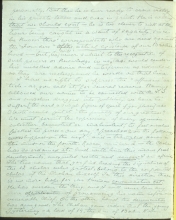Страница 8
personally. But then he is ever ready to crow victory in his private letters, and even in print. He is willing that we should exist — he is too clever to risk at this hour being caught in a want of sagacity, since he knows through correspondents who are dead against the "Founders" of the actual existence of our Brotherhood — but, he will never submit to the recognition of such powers or knowledge in us, as would render his unasked advice and interference as ridiculous as they are useless; — and he works on that line.
I had no right to suppress the "offensive" article — as you call it, for several reasons. Having allowed our name to be connected with the T.S. and ourselves dragged into publicity, we have to suffer (the verb, a simple figure of speech if you please) — as Olcott would put it "the penalty of our greatness." We must permit the expression of every opinion whether benevolent or malevolent; to feel ourselves picked to pieces — one day; "preached" — on the following, worshipped — on the next; and — trampled down in the mud — on the fourth. Reason No. 2 — the Chohan has so ordained it. And with him this means fresh developments, unexpected results, and DANGER, I am afraid. The two names that you find heading the signatures of the 12 chelas who protest, belong to the confidential chelas of the Chohan himself. In this direction there is no more hope for Mr. Hume — consummatum est. He has overdone the thing, and, I will never have any more opportunities of pronouncing his name before our venerable chief. On the other hand, the denunciation has done good. The Chohan gave orders that the young Tyotirmoy — a lad of 14, the son of Babu Nobin



The two names in the "Protest" to Mr. Hume's article (published in The Theosophist in Sept., 1882, p. 326) are "Deva Muni" and "Paramahansa Shub-Tung". The ten other chelas, all members of the Theosophical Society, were T. Subba Row, Dharbagiri Nath, S. Ramaswamier, Guala K. Deb, Nobin K. Banerjee, T. T. Gurudas, Bhola Deva Sarma, S. T. K.....chary, Gargya Deva, and Damodar K. Mavalankar.
consummatum est is Latin for "It is finished." Jesus Christ is quoted as saying this phrase when he was dying upon the cross.